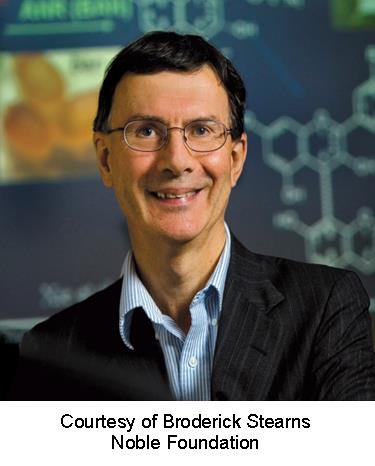Dixon Lab: Understanding and Manipulating Plant Metabolism for Agriculture, Energy and Health
 PROFESSIONAL EXPERIENCE
PROFESSIONAL EXPERIENCE
Richard A. Dixon is Distinguished Research Professor in the Department of Biological Sciences at the University of North Texas, Denton. He was previously Distinguished Professor and Samuel Roberts Noble Research Chair, Senior Vice President and Founding Director of the Plant Biology Division at the Samuel Roberts Noble Foundation, Ardmore, Oklahoma, where he worked from 1988-2013. He holds Adjunct Professorships at Rice University, the University of Texas at Austin, Washington State University, Oklahoma State University and the University of Oklahoma. He received his Bachelor's and Doctoral degrees in Biochemistry and Botany from the University of Oxford, UK, and postdoctoral training in Plant Biochemistry at the University of Cambridge, UK. He was awarded the Doctor of Science degree for his research achievements by the University of Oxford in 2004. His research interests center on the biochemistry, molecular biology and metabolic engineering of plant natural product pathways and their implications for agriculture and human health, and the engineering of lignocellulosic biomass for the improvement of forage and bioenergy feedstocks. He has published over 400 papers and chapters on these and related topics in international journals. Professor Dixon is a Member of the US National Academy of Sciences (Plant and Soil Sciences Section, elected in May 2007), a Fellow of the American Association for the Advancement of Science (elected in 2003), a member of the Editorial Boards of five international journals, and has been named by the Institute for Scientific Information as one of the 10 most cited authors in the plant and animal sciences.
RESEARCH SUMMARY
Our laboratory is part of UNT's "Signaling Mechanism in Plants" and "Renewable Bioproducts" research cluster s.
s.
Work in the Dixon laboratory centers on the metabolic engineering of plant natural product and cell wall pathways. Fundamental studies target the biosynthetic pathways of a range of natural products including flavonoids, isoflavones, condensed tannins, and terpenoids. We are interested in discovering new enzymes in these biosynthetic pathways, utilizing genomic and genetic approaches. We are also engineering these pathways for production of plant metabolites that positively impact human health or improve the quality of forage crops.
Work on plant cell wall engineering is targeted towards the modification of the lignin polymer to generate forages with improved digestibility and bioenergy crops that are easier to process to ethanol and other liquid biofuels.

